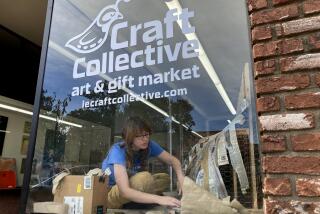They Do: Just Supply a Couple of Customers
- Share via
DUBLIN, Ohio — To hear Carol Feinberg tell it, finding a mate is the easiest part of planning a wedding.
There are so many things to do--find a dress, order the cake, buy invitations, book a caterer, order flowers, pick out gifts for the bridesmaids, hire a band. And that’s not even half of it.
Meanwhile, bridal couples “usually have dual incomes and they don’t have quite as much time,” said Feinberg, president of We Do Inc., a bridal superstore in this northwestern Columbus suburb.
Couples end up going to a variety of stores and other businesses to organize a wedding. So We Do and some of its competitors offer an alternative--one-stop (or close to it) wedding shopping.
We Do is almost like a Home Depot for the soon-to-be-married: a 26,000-square-foot matrimonial mecca that sells 600 styles of bridal gowns that cost from $300 to $2,500. Also in stock are dresses for attendants and guests, rental tuxedos, bridal party gifts, stationery, shoes, lingerie and jewelry.
The store boasts a large inventory of such items, and makes referrals to florists, caterers, photographers, musicians, limo drivers and reception halls.
One of We Do’s competitors, Wedding Expressions, goes further, keeping photographers, bakers, florists and other wedding professionals on staff.
*
For Feinberg, a veteran retailing executive who was a senior vice president with Blockbuster Entertainment Corp., the $30-billion wedding industry was a niche waiting to be filled. She and an investor group opened the first We Do in Dublin last October, and plan a total of 40 stores.
“They have everything here . . . so you can get the whole perspective,” said Chris Olson. The 27-year-old bride-to-be, who plans a May 1997 wedding, recently made her second trip to the superstore, narrowing her choice of gowns.
Olson was certain she would buy her gown, the bridesmaids’ dresses and accessories at We Do. But she was not sure she would take the store’s suggestions on a caterer, florist and other wedding service providers.
Like many brides, who spend an average of $8,000 on a wedding, she said she wants to visit other stores to see what’s available.
Retail analyst Ron Petrie of Roney & Co. in Detroit has mixed feelings about how the superstore--or “category killer”--concept will play in the wedding industry.
“It’s obviously a concept that could have some appeal,” Petrie said.
On the other hand, the so-called “big-box” drugstore--with its groceries, sporting goods, lawn chairs and other products fronting the pharmacy--also seemed like a can’t-miss idea.
“Big-box drugstores have proven to be a big disappointment. People would rather have convenience than selection and price,” Petrie said.
For We Do to become the next category killer, a lot of things will have to fall in place, Petrie said. “People would still have to feel they’re getting a unique experience.”
Feinberg, who also has worked for Thom McAn and the Lerner New York division of Limited Inc., said she started shopping for a new retailing concept about two years ago.
“When I came across the wedding industry, I saw that it really hadn’t been consolidated and rationalized,” she said. “It’s still much a fragmented business--very much like the video industry was when I came into it at Blockbuster Video. There are a lot of small, mom-and-pop stores.”
*
Other players in the wedding industry aren’t worried about stores like We Do.
“They really haven’t hurt us,” said Sherry Pritt, sales supervisor at David’s Bridal, which sits directly across the street from We Do. “I think brides like to shop around.”
David’s, part of a 39-store national chain based in Ardmore, Pa., focuses on wedding gowns, but operates a little differently than most traditional bridal stores. It keeps more than 2,500 dresses in various sizes in stock. A bride can pick what she wants off the rack, have it altered in-house and be on her way.
They usually wait several months for custom-ordered dresses at We Do and smaller bridal boutiques.
Pritt said she has noticed that most of her customers already have visited, or plan to check out her rivals.
“I think competition can help by bringing more people to the area,” she said.
Even the full-service Wedding Expressions, a Wichita, Kan.-based company with franchised and company-owned stores in nine Midwestern cities, expects brides to look elsewhere.
Vice President Steve Marsh said Wedding Expressions stores sell about 60% of the total wedding package to a given customer, and he figures that’s probably as high as possible.
“The customers, the brides, like to shop,” he said. “Next to having children and buying a house, this is probably the biggest thing in their lives. They like to make a production out of it.”
More to Read
Inside the business of entertainment
The Wide Shot brings you news, analysis and insights on everything from streaming wars to production — and what it all means for the future.
You may occasionally receive promotional content from the Los Angeles Times.










